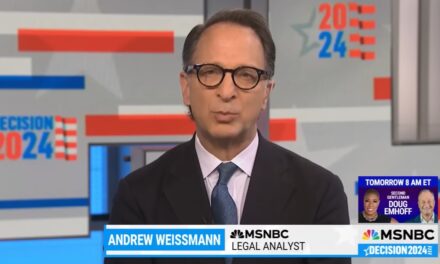We support our Publishers and Content Creators. You can view this story on their website by CLICKING HERE.
In the now famous Bostock case in 2020, Justice Neil Gorsuch set off a new wave in the culture war by imparting a constitutional wind in the sails of transgenderism. In the companion case of Harris Funeral Homes, it came down to these hard findings: When Anthony Stephens earnestly professed to regard himself as a female on everything that matters in life, the people around him, employees or employers, were obliged to respect that judgment. If they didn’t, they put themselves in legal peril for turning him out of his job on the basis of “sex” or preserving a “hostile work environment.”
The Civil Rights Act of 1964, Title VII, had come to bar discrimination in employment based on sex, along with race, color, and religion. But it was a stretch now to bring under the Act the notion of “gender identity” as opposed to the most objective differences that ever mark the differences between males and females.
Justice Samuel Alito, in dissent, responded at once that this was not a judicial holding in Bostock but a legislative act. Neither “sexual orientation” nor “gender identity” appeared on that list of things barred in the statute. Over the past 45 years, bills had been introduced to add “sexual orientation” and “gender identity” to the list, but none of those had drawn enough support in Congress to amend the law.
As Alito said, “It was as clear as clear could be that [the statute meant to bar] discrimination because of the genetic and anatomical characteristics that men and women have at the time of birth.” But in the meantime, as he warned, the holding would not really be confined to cases of employment under Title VII.
Gorsuch had dismissed concerns about “bathrooms and locker rooms” because those issues were not before the court, but Alito noted that it was indeed “a matter of concern to many people who are reticent about disrobing or using toilet facilities in the presence of individuals whom they regard as members of the opposite sex … the court provides no clue why a transgender person’s claim to such a bathroom or locker room access might not succeed.”
And indeed, in an interval measured nearly in milliseconds, the cases were already appearing in federal courts. A panel of the 11th Circuit astonished Chief Judge William Pryor as it struck the policy of a school board in Florida to confine bathrooms to boys and girls (Adams v. School Board of St. Johns County, Florida). Even more remarkable was the decision of a federal district judge of the 9th Circuit to block a law in Idaho that sought to bar males from entering and dominating women’s sports teams as they sought to transition into females (Hecox v. Little).
As Alito warned in Bostock, these questions were already arising under Title IX for schools receiving federal funds. There were also problems, now foreseeable, of discrimination against the trans-identifying people under the federal Fair Housing Act, and with colleges as they assign roommates or try to preserve dorms restricted to one sex. He continued to unroll the possibilities now emerging.
There was the matter of religious freedom for schools that may be averse to having a trans-identifying teacher standing as a role model before their students, in striking opposition to the religious convictions that mark the character of the school.
In the field of health, cases had already been brought, challenging private firms that would not provide support, in their benefits, to cover “sex reassignment” surgeries. Claims had already been brought under the Affordable Care Act.
And finally, threats to free speech. Some jurisdictions in New York had already made it a punishable offense to refuse to use the pronoun that matched a person’s preferred sexual identity. Rules of that kind were already taking hold in some colleges, and as Alito noted, with the decision in Bostock, “plaintiffs may claim that the failure to use their preferred pronoun violates one of the federal laws prohibiting sex discrimination.”
In other words, there was no way to cabin this new holding on “sexual discrimination.” Even at the time of Bostock, this new angle on “sexual discrimination” had swept well beyond cases on employment. And with Gorsuch’s opinion, there would be a new sense of constitutional rightness that would be powering claims all over the landscape with no clear boundaries. Not long ago I was told by a lawyer working for Gov. DeSantis in Florida that there were ongoing arguments about abortion, but the cases springing from Bostock were crashing in on them every day of the week.
As Alito remarked at the time, the court’s opinion in Bostock was “not only arrogant; it [was] wrong.” But if the court had it wrong, we need to recall, as Alito said, that the majority was offering its genius here as an example of “high textualism.” Gorsuch was offering a searching inquiry into the “text” of the statute. But if the decision hinged on a reading of the statute, it is open to Congress to affirm the original meaning of that statute. With Republicans in control of Congress, why should that not be done now?
We are warned that the Republicans in the House have only the slenderest of margins. And yet that is evermore the reason to press ahead with this measure. The Democrats know that on this matter of transgenderism — and what it touches in the culture war — they are crosswise with the American public. This issue hurt them badly in the election.
Many Democrats will feel under pressure to take the first step in moderating themselves. The Republicans may find themselves then with new allies and more than a slim margin. But either way, it is a win-win for the Republicans. If they lose, the Democrats will dig themselves even more deeply into the cause of transgenderism. And if the Republicans succeed, they will have accomplished a vast good for the country.
Prof. Hadley Arkes is the founder and director of the James Wilson Institute on Natural Rights and the American Founding. He was also the architect of the original Born-Alive Infants’ Protection Act (2002).

 Conservative
Conservative  Search
Search Trending
Trending Current News
Current News 





